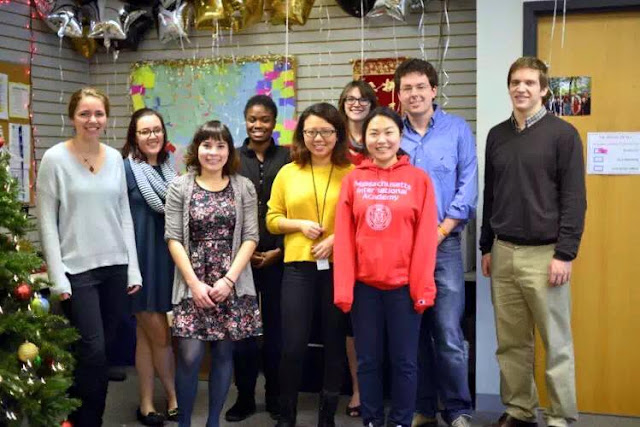By working as a student advisor for predominantly Chinese international students at an ESL school, I have been exposed to a different world I never envisioned. I thought I could relate to the students on a deeper level, because I came to the states from Mainland China about seven years ago as an international student. However, the comportment of Chinese international students has changed so much in the past decade. According to SEVIS record, educational institutions in the US welcomed more than one million international students in 2015; the number is certainly surging in 2016. Chinese and Indian international students constitute the majority component of the international student population on U.S campuses.

The student advisor team at my school (I'm in yellow)
For me, it is easy to distinguish Chinese international students from Asian American students; on campus, I witness international students wearing designer brand clothing, cruising around in their luxury sports cars, and constantly skipping classes. They do not thrive as much as the previous wave of international students did, especially those coming from China. I then contemplate why it is getting harder and harder for international students to excel on U.S campuses? I am encouraged to look deeper into the reasons why they are abroad, and start to question whether they are ready to study abroad at such a young age.
Being a student advisor has been a fairly rewarding experience. I advise and mentor Chinese international students on a daily basis, and one of the core questions I always ask my students is: what do you want to study? Surprisingly, most of them want to study business, management, finance, or accounting because their parents want them to excel in the field and maybe take care of their family-owned company in the near future; or simply because they believe those majors provide better job prospects in the U.S.
Sometimes, advising becomes dull because I can already foresee students’ answer to my question.
It gratifies me every once in a while when a student finally answers: Ms. Lin, I think I would like to study literature…though that answer comes in a weak tone with tremendous amount of uncertainties. I always assure them that they will thrive as long as they are diligent and persistent. I am so afraid they will stray away from their true passions because of language barriers or their parents/friends’ opinions. I always try my best to reassure them as to how great it feels when you pursue your passion even during the hard times.
We need more international students who are adventurous enough to not only physically come to the US, but also brave enough to pursue their real passions. If studying abroad means spending your parents’ money or following the route they choose for you, why bother spending $40,000 a year abroad? Some of the international students I interact with on campus spend most of their time gaming or shopping at luxury stores; going to classes is almost like a task for them, instead of a pleasure. Receiving a foreign education has become a necessity for many wealthy Chinese families. The parents are financially ready to send their kids to the U.S for a foreign education, and hope their kids come back with fluent English and abundant knowledge in business.
But are the students ready?
They might be physically ready, but how much do they know what studying abroad entails? I am glad receiving a foreign education is becoming so much more convenient in this globalized world, but I wish the students could take a step back and think thoroughly before they leave their country - am I ready to embark on a journey abroad?
Lin Yuhan is the culture and politics editor for Wandering Educators
